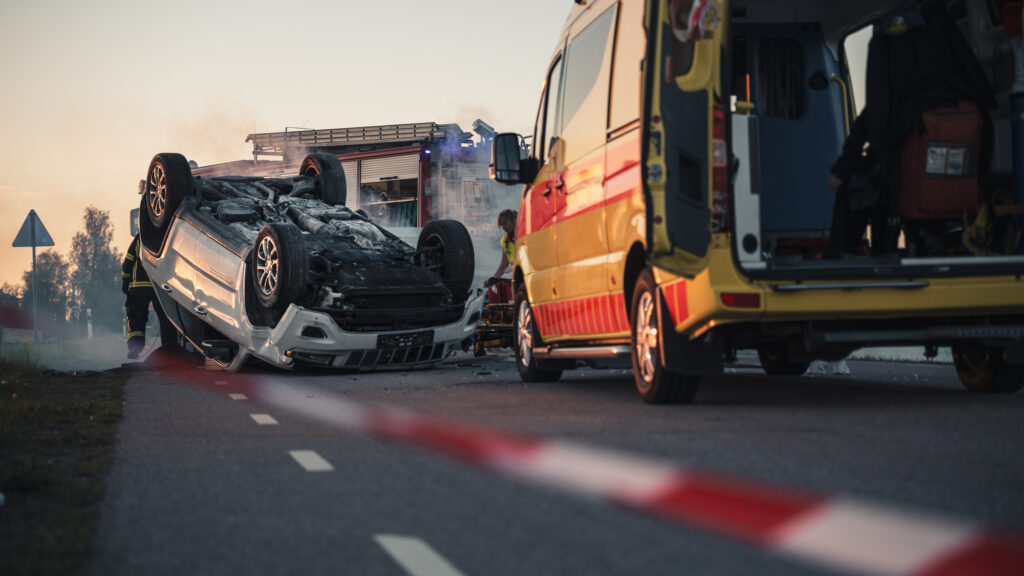Getting into a car accident is stressful, even when it seems minor. Whether it’s a fender bender or a more serious crash, your next steps matter, not just for your safety, but also for your health, your rights, and your ability to pursue a car accident claim.
At KFB Law, our car accident lawyers have helped countless Floridians navigate the aftermath of an accident. Here’s our guide for what to do immediately after a car accident in Florida, including key steps to take at the scene and in the days that follow.
1. Stay Calm and Check for Injuries
Before anything else, take a breath. Staying calm helps you think clearly.
Here’s what to do:
- Check yourself and your passengers for injuries.
- Call 911 right away if anyone appears hurt, even if they say they’re fine.
- If it’s safe to do so, move vehicles out of traffic using your hazard lights to alert others.
In Florida, you’re required to report accidents involving injuries, death, or property damage over $500. When in doubt, call the police.
2. Call the Police and Wait for Officers to Arrive
Even if the crash seems minor, always call the police to obtain a police report. You’ll need an official accident report for your insurance company and any potential personal injury claim.
When the officers arrive:
- Provide accurate information, but don’t speculate about fault.
- Ask for the police officer’s badge number and a copy (or report number) of the police report.
- Be respectful, and let them do their job. Their documentation could be key evidence later.
3. Exchange Information With the Other Driver
Florida law requires drivers involved in a traffic accident to exchange information, including:
- Full name and contact info
- Driver’s license number
- License plate number
- Insurance information and policy number
Avoid discussing fault with the other driver. Even a simple “I’m sorry” can be misunderstood later in the claims process and result in a denial.
Also, collect telephone numbers and any other contact information for accident victims, passengers, or witnesses at the scene.
4. Document the Scene Thoroughly
Use your phone to capture the complete picture of what happened from different angles. You may need this later to support your insurance claim or personal injury lawsuit.
If possible, take photos of:
- All vehicles involved, from multiple angles
- Visible injuries
- License plates
- Traffic signs or signals
- Skid marks, broken glass, or road debris
- The overall accident scene and any property damage
Jot down details like the time of day, weather conditions, and anything unusual.
5. Seek Medical Attention (Even if You Feel Fine)
Under Florida’s Personal Injury Protection (PIP) laws, if you are injured, you must seek medical treatment within 14 days of the accident to access benefits for medical expenses and lost wages.
You might feel okay right after the crash, but that doesn’t mean you’re injury-free. Adrenaline can mask pain. Get checked out by a doctor or go to an urgent care clinic. Keep all medical records, including diagnoses, prescriptions, and medical bills, because they may be essential for your case.
6. Notify Your Insurance Company
Report the accident to your insurance provider as soon as possible. Most policies require prompt notice.
When talking to your insurer:
- Stick to the facts
- Don’t admit fault
- Avoid making statements about the extent of your injuries until you’ve seen a doctor
If the other driver’s insurance company contacts you, be cautious. You’re not required to give a recorded statement, and it’s wise to consult with a personal injury lawyer first.
7. Watch Out for Quick Settlement Offers
If you’re injured, insurance adjusters may try to offer you a fast settlement. But that initial offer might not cover:
- Ongoing medical expenses
- Lost wages from time off work
- Repair costs for your vehicle damage
- Future treatment or complications
- Pain and suffering
Once you accept a settlement, you typically can’t go back and ask for more. That’s why it’s smart to talk to a personal injury lawyer before signing anything.
8. Understand Florida’s No-Fault Laws
Florida follows a no-fault insurance system for motor vehicles, which means your own insurance (PIP) pays for medical bills and certain other expenses, regardless of who caused the crash.
However, if you’ve suffered serious injuries, you may be able to step outside the no-fault system and pursue a claim against the at-fault driver for:
- Medical bills beyond PIP limits
- Lost income
- Pain and suffering
Knowing when and how this applies can be complex. That’s where legal guidance can help.
9. Know Your Legal Rights and Time Limits
Under Florida law, you generally have two years from the date of the accident to file a personal injury lawsuit (as of changes to the statute of limitations in 2023). However, it’s advisable not to wait; key evidence can disappear fast.
10. Speak With a Personal Injury Lawyer From KFB Law
The aftermath of a car crash can be overwhelming. You may be dealing with injuries, medical bills, car repairs, and missed work, all while getting calls from insurance companies.
An experienced Florida car accident attorney can:
- Help protect your rights
- Explain your legal options
- Handle the details while you focus on recovery
- Handle communications with insurance companies
- Help you navigate the claims process
- Build a strong case for fair compensation
At KFB Law, we understand the life-changing impact of a car accident. We’re here to provide clear, compassionate guidance every step of the way.
Need Help After a Florida Car Accident?
Every accident is different, and the right next step depends on your situation. At KFB Law, we’re here to listen and to help personal injury and car accident victims get the compensation they deserve so they can heal.
We’ll start with a conversation about what happened. You’re not alone, and you don’t have to figure this out on your own. Schedule a free consultation with a member of our team today.
FAQs About Car Accidents in Florida
If it’s just a fender bender, do I have to call the police?
In Florida, you’re legally required to report any accident involving injuries, a fatality, or property damage over $500. Even if the crash seems minor, calling the police helps ensure an official accident report is filed, which protects you if the other driver later files a claim or disputes what happened.
What happens if the other driver doesn’t have insurance in Florida?
If you’re hit by an uninsured driver, your Personal Injury Protection (PIP) coverage will pay for your medical expenses, but that may not be enough. Depending on your policy, uninsured motorist coverage may also help cover damages. If not, you may need to explore a personal injury lawsuit against the at-fault driver.
If I’m a passenger, can I leave the scene of the accident?
In most cases, passengers are not legally required to stay at the scene unless they’re involved in a police investigation or are injured. However, if you’re a witness or may need medical attention, it’s smart to wait for police officers and provide your information. If you leave, make sure you seek medical treatment right away and document your injuries.
Should I talk to the other driver’s insurance adjuster after a car crash?
No. You are not required to speak with the other driver’s insurance adjusters, and doing so may hurt your claim. They may ask for a recorded statement, which could be used to minimize or deny your claim. Always speak with one of our personal injury lawyers first.
How can I recover lost wages after a car accident in Florida?
Through your PIP coverage, you may be entitled to up to 60% of your lost wages (subject to limits). If your injuries are serious and someone else was at fault, you may also be able to pursue additional compensation through a car accident claim or personal injury lawsuit.



